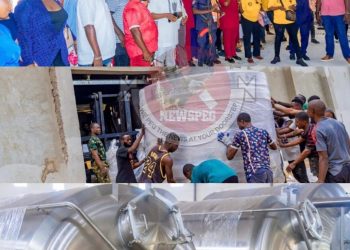By Nkechi Eze
In a major infrastructural push that signals renewed vigor in cross-border development and bilateral relations, the Federal Government of Nigeria has commenced construction of a transnational highway linking Gembu, the headquarters of Sardauna Local Government Area in Taraba State, to Lip Village, a border community that straddles Nigeria and the Republic of Cameroon.
The road project, valued at over ₦70 billion, is being constructed with a rigid pavement design using concrete technology, ensuring durability and long-term resilience. Designed to be completed within a 30-month timeframe, the project has already recorded impressive progress with over 16 percent of the work completed in under six months, outpacing the expected 15 percent benchmark at this stage.
This ambitious cross-border infrastructure is not only viewed as a civil engineering milestone, but also as a catalyst for regional integration, enhanced trade, and stronger Nigeria–Cameroon diplomatic ties. Stakeholders across government, local communities, and the private sector have all hailed the project as transformative for the people of Taraba and a strategic asset in deepening regional cooperation.
Leading a high-level inspection tour of the project site, Taraba State Governor, Dr. Agbu Kefas, expressed satisfaction with the pace and quality of work being carried out. He commended the Federal Government for its strategic foresight and called the initiative a long-awaited dream come true for the people of Sardauna LGA and the Mambilla Plateau.
“I am highly impressed by the quality of work done so far and the speed with which the project is progressing,” Governor Kefas remarked. “This road will change everything. It will open this entire region to economic and diplomatic opportunities that were hitherto unimaginable.”
The Supervising Engineer from the Federal Ministry of Works, Mr. Otis Danjuma, provided further technical insight into the scope of the project, noting that the contractor was working within the 30-month timeline and had shown strong commitment to delivering on schedule.
“This project is a priority for the Federal Government, and we are maintaining strict supervision to ensure that standards are not compromised. We are currently ahead of time with over 16 percent completed, which speaks to the competence and seriousness of the construction team,” Danjuma said.
Also speaking during the visit, a member of the Taraba State House of Assembly, Mr. Abel Peter, described the Gembu–Lip road as a strategic international link that would redefine the region’s developmental trajectory. He noted that, once completed, the road would significantly boost economic ties between Nigeria and Cameroon while also improving access to markets and services for remote communities in Taraba.
“The benefits of this road are enormous. We are now connected not only to the rest of Nigeria but also to our Cameroonian neighbors. It is a game-changer for agriculture, tourism, and education,” he stated.
Similarly, the Secretary to the Taraba State Government, Mr. Gibon Kataps, emphasized the importance of federal intervention and funding in accelerating the execution of the project. According to him, the project would not only unite communities that have long suffered neglect but also demonstrate how strategic federal-state collaboration can deliver tangible results.
“The Federal Government’s role in financing this critical project is commendable. It proves that with the right leadership and political will, infrastructure can be used as a tool for inclusion, integration, and economic transformation,” Kataps said.
The Chairman of the Taraba State Peoples Democratic Party (PDP), Mr. Abubakar Bawa, also hailed the project as a driver of socioeconomic revival in the border region. He stated that improved road infrastructure would reduce the cost of doing business, promote mobility, and expand access to regional markets, particularly for traders and entrepreneurs who have long been hampered by poor road conditions.
“This road will bring prosperity to our people. It will connect farmers to markets, reduce travel time, and facilitate the exchange of goods and services across the border,” Bawa added.
Prior to the commencement of the project, the Gembu–Lip corridor was in a deplorable state. The dilapidated roads and damaged river crossings posed severe risks to commuters, while the absence of basic infrastructure forced many residents, especially school children to cross into Cameroon in search of education and essential services.
According to local residents, the deteriorated condition of the road led to decades of neglect and marginalization, cutting off border communities from national development programs and economic opportunities. For many, the start of construction has brought a renewed sense of identity and inclusion.
“This road has not only opened our area for international business and strengthened Nigeria-Cameroon relations but has also given our people a new sense of belonging,” said one community leader, who spoke with reporters during the governor’s visit. “For the first time in a long while, we feel seen and heard.”
The road is expected to serve as a vital economic and logistical artery, connecting the Mambilla Plateau and Sardauna LGA with Cameroon. Upon completion, it will greatly improve the movement of goods and services, enabling easier access to both domestic and international markets. Experts also predict that the project will help reduce rural poverty, improve agricultural exports, and boost regional commerce.
In anticipation of the increased population movement and commercial activity along the route, Governor Kefas urged the construction company to incorporate education support into its corporate social responsibility efforts. He called on the firm to establish schools along the corridor to discourage the cross-border migration of Nigerian children in search of learning opportunities.
“Establishing basic schools here will stop the trend of our children crossing into Cameroon for education. It will also encourage retention and help secure the future of our youth,” he said.
The Gembu–Lip road project is part of the Federal Government’s broader commitment to leveraging infrastructure as a tool for national unity, economic diversification, and regional integration. With strong presidential backing and dedicated funding, it currently ranks among the fastest-moving trans-border construction projects in Nigeria.
For the people of Taraba State, particularly those residing in the remote Mambilla highlands, the project has already started to deliver value. It is not just a road, it is a promise fulfilled, a bridge to progress, and a bold statement that even the most forgotten corners of Nigeria matter.

















